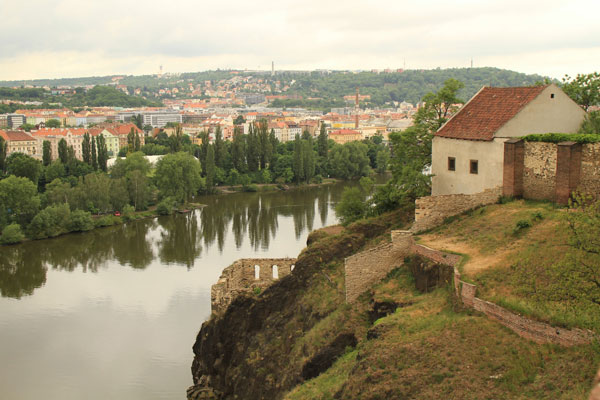
Vysehrad
A long, long time ago, a wise ruler in Vysehrad Castle had three beautiful daughters: Kazi, who knew medicine, Teta, who was a weaver, and Libuse, who could predict the future. Eventually, Libuse inherited the throne. Foreseeing that men in her kingdom might stage a coup in revolt of a female leader, Libuse told her people, “I saw a great city, in the mountains on a cliff overlooking the Vltava River. A man was building the threshold (prah) of a castle called Praha. Kings and dukes will bow in front of the castle and the city surrounding it. It will receive people’s respect.”
Next, Libuse dispatched a messenger into the woods to look for a farmer to build a prah for the new castle. The farmer later returned to Vysehrad with the messenger, married Libuse, and built a new kingdom. Thus, Praha was born.
After the kingdom moved to Praha, Vysehrad gradually lost its importance. Today,not too many tourists visit Vysehrad and that is exactly why I like it.A deserted place with few tourists stirred in me a longing for ancient times.
A famous point of interest in Vysehrad is the ruin of Libuse’s bath. It is said to be where Libuse and her lovers bathed and frolicked. Rumor has it that, when Libuse became tired of a lover, she would order to have him pushed off a cliff. Though Libuse is made to look like one of those despotic rulers in history, but it is only a legend adding romance to this nearly forgotten corner.
Speaking of romance, most people don’t think of the Czechs as romantic people. When traveling in Prague, I also found it hard to detect any Bohemian spontaneity in the usually serious Czech people. However, I did pass by many lovers embracing and kissing in the street. They were natural and sweet, not so overly passionate as to make passersby blush, nor so ostentatious as to make others frown. I listened to their conversations when passing them, and it did sound like Czech. Perhaps the Czechs appear to be aloof not by nature, but because of Socialism?
In Vysehrad I lingered in the cemetery in front of St. Peter’s Church where over 50 famous Czechs were buried, among whom I’m familiar with Alphonse Mucha, an artist, Antonin Dvorak, a composer, and Jan Kubelik, a violinist, etc. The atmosphere made me think of my father, who passed away last year. Rest in peace - such wonderful words.
Josefov (Jewish District)
It goes without saying that the Jewish people have an extraordinary will to live and an ability to survive. Perhaps the tremendous oppression and prejudice they had to suffer led them to convert their injuries into energy, evidencing what Mencius described as “living on sorrow & tragedy.”
In the early days, the Jews in Prague were forced to confine their activities within Josefov. Joseph the Second abolished this law, which put the Jews under house arrest. The true intention of the abolishing the law was to make the Jews mix and mingle in the Christian communities hoping that they would eventually be assimilated by the Christians. Though it seemed like a smart move at the time, but there was little success, because he underestimated the strength and stubbornness of religion.
Prior to Nazi occupation, Prague had considerable racial tolerance. Most of the residents were Czech, German, and Jewish. During World War II, most Jews either fled or died in the Holocaust. After the Nazi invaded Prague, surprisingly, Josefov was preserved. At first people thought the Gestapo respected history, but they later realized that the Nazi really wanted to use Josefov as a museum to showcase their genocide. Ironically many precious Jewish historical records were saved as a result. After the war and in the era of the Communist rule, even though most Jews had moved overseas, this special area for the Jews in Prague is still reserved through the years.
I don’t usually have any misgiving entering a cemetery. I actually was very fond of the solemnity of the cemetery in Vysehrad. However, standing at the entrance of the cemetery in Josefov, I felt very uncomfortable and didn’t want to go in. Perhaps there were many spirits from violent deaths causing a sense of unease in me. I did enjoy taking a walk along the street outside the cemetery, especially in the Maiselova Market, which reminded me of the small grocery store where I, when I a little girl, sneaked out to play games of drawing lots. When the sun came out after rain, the ground glistened from the sunshine, warm and serene.
|